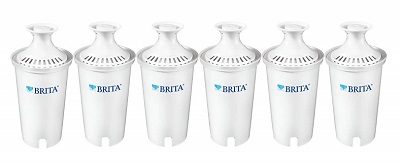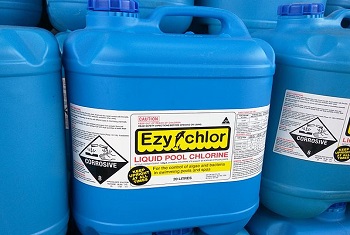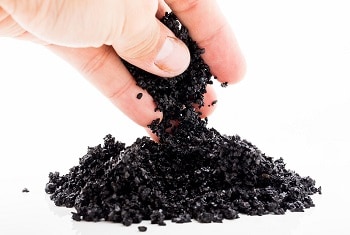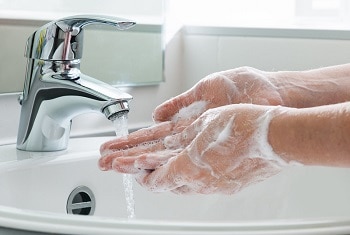UPDATED: December 3, 2022
You have had enough of your water not tasting as pure and clean as you would like it to be, and that slight odor that you get from it is outright embarrassing when you have guests over. You have thought about getting a Brita water filter, but how long do Brita water filters last?
Brita states that their standard filter or bottle filter should be replaced every 40 gallons or 2 months, Faucet Mount Filter every 100 gallons or 4 months, and their long last filter, every 120 gallons or 6 months. Excessive water contaminants may require changing your Brita filter more often.
Everyone wants to live a healthier lifestyle, and most people are willing to do things that will make them healthy and fitter (As long as it’s easy to do). I think that this is why water-filtering pitchers have become so popular. But water pitcher filters don’t last forever.
Here’s What We Will Be Covering!
- How A Brita Filter Can Improve Your Water, And For How Long.
- How To Gauge How Often You Should Change Your Brita Filter.
- How Often Do YOU Need To Change Your Brita Water Pitcher Filter?
- How Long Will A Brita Filter Remove Chlorine?
- How Chlorine May Affect How Long Your Brita Water Filter Will Last. (Reference Table)
- What A Brita Filter Does, And Why You Need To Change It.
- What Happens If You Don’t Change Your Brita Filter Often Enough?
- How To Change Your Brita Filter. (With Video!)
- Can You Use Brita Filters That Have Expired?
- What Should You Do With Your Old Brita Water Filters?
How a Brita filter can improve your water, and for how long.
It is very important that you understand that passing your drinking water through an activated charcoal filter like the ones used in a Brita pitcher will only remove some of the impurities that can cause your water to have an unpleasant taste.
It is important to understand that a Brita pitcher is not a reverse osmosis drinking water system.
Unlike a reverse osmosis drinking water system that uses a semi-permeable membrane for long-term filtering of dissolved solids and other contaminants from your water, a Brita water filter removes contaminants from your water and has to be changed more frequently.
Excessive salts and other dissolved solids are not removed from your water, and using a Brita filtering pitcher does not ensure that you are drinking healthy water.
A Brita water filter is for the removal of Chlorine (Taste & Odor), Mercury, Cadmium, Benzene, Asbestos, Particulates, Copper, Zinc, and other contaminants that can add an unpleasant taste or odor to your water.
How to gauge how often you should change your Brita filter.
Since Brita has a few different-sized containers, I recommend that you figure out how much Brita-filtered water you use per day to calculate how often the filter should be changed, and look for certain indications that your Brita filter should be changed.
Some Indications That Your Brita Water Filter Needs To Be Changed:
- Poor Tasting Water: You may notice your Brita-filtered water begins to taste more like your unfiltered tap water.
- Odors In Your Water: When your Brita water filter nears the end of its effectiveness, you may begin to notice odors in your water that a Brita filter would normally remove.
- Slow Filtering: A clogging Brita filter will begin to produce filtered more slowly as the filter becomes clogged with the impurities that it has removed.
- Cloudy/ Discolored Water: A Brita filter that is no longer able to remove gasses and impurities from your water can allow the gasses or impurities to end up in your Brita dispenser making your Brita-filtered water appear cloudy or discolored.
- Algae Or Bacteria Growth: Impurities that get passed a Brita water filter that is overdue to be changed can be a starting point for algae or bacteria growth.
I recommend determining filter changes by days or weeks rather than by container fill-ups because if someone has a tendency to fill the container, and does not log in that they did, then you could be using the filter way longer than you should.
Although Brita water pitchers use a filter replacement indicator to alert you to when you should change your Brita filter as suggested by Brita, the indicator works based on how many times the pitcher or container has been opened to refill and NOT on your individual circumstances.
Pay close attention to your filtered water usage for 1 week, and then you should be able to determine very closely, how soon you will use 40 gallons of filtered water.
For example, if you find that you use 10 gallons of Brita-filtered water in one week, you should change your standard Brita water filter after 4 weeks. If you find that you only use 5 gallons in one week, then you should change your standard Brita water filter every 8 weeks.
It’s up to you how strictly you want to adhere to the 40-gallon change rule, I don’t like to call it a rule, but rather just a rule of thumb.
Brita recommends a new filter for every 40 gallons of water used based on what they expect to be an average case scenario of water that a Brita water filter would be effective for. If your water tastes horrible straight from the tap, you should probably be changing your filter cartridge every 40 gallons (or sooner).
How often do YOU need to change your Brita water pitcher filter?

I don’t like to talk about how often you will need to change a Brita water filter without explaining that it’s not as simple as X amount of gallons or X amount of time. It depends on the quality of the water to be treated and how much water is being used.
You may use more or less water than your next-door neighbor, and your friend down the road may have very different water issues than you do. So naturally, you may need to change your Brita water filter more or less often than they will.
Brita states that their standard filter should be changed after 40 gallons of water have gone through it, or 2 months, whichever comes first.
How long will a Brita filter remove chlorine?

Chlorine in municipal water is one of the leading reasons why people choose to use a Brita water filter. Chlorine gives water an unpleasant taste, and odor making it less desirable to drink.
Because the level of Chlorine in municipal water can vary from household to household. If your water has a high level of Chlorine in it, your Brita water filter may not last as long as with water with a lower level of chlorine in it.
A Brita water filter uses carbon to remove chlorine from your water, but the carbon is not effective forever and high levels of chlorine can shorten the effective life of the carbon in a Brita water filter.
How chlorine may affect how long your Brita water filter will last.
The approximate life expectancy of a Brita water filter for chlorine removal.
| Level of chlorine in Parts Per Million | Standard Filter | Long Last Filter | Bottle Filter | Faucet Filter |
| 0 – .5 | 40 Gallons or 2 Months | 120 Gallons or 6 Months | 40 Gallons or 2 Months | 100 Gallons or 4 Months |
| .6 – 1.0 | 30 Gallons or 6 Weeks | 100 Gallons or 5 Months | 30 Gallons or 6 Weeks | 80 Gallons or 3 Months |
| 1.1 – 1.5 | 20 Gallons or 1 Month | 60 Gallons or 3 Months | 15 Gallons or 3 Weeks | 50 Gallons or 2 Months |
| 1.6 – 2.0 | 10 Gallons or 2 Weeks | 20 Gallons or 1 Month | 10 Gallons or 2 Weeks | 25 Gallons or 1 Month |
If your water is very poor tasting to start with, you should consider a reverse osmosis drinking water system for a much higher level of water purification.
But if you are using your Brita filtering pitcher just as a precautionary measure to make you feel a bit better about the water that you are drinking, then you may only want to change the carbon cartridge every 50 gallons or so since they are a bit expensive.
What a Brita filter does, and why you need to change it.
If you are using your filter for water that needs minimal filtering, the filter should be able to last longer than if you are filtering highly contaminated water. This should be true, but is it?
A Brita filter cartridge (both white and blue) uses activated carbon to remove certain contaminants in water that can give it a metallic, chemical, or other odd taste. This activated carbon loses its ability to remove contaminants the more that it is used.

This means that the activated carbon in a Brita filter will lose its effectiveness at some point, whether the water being treated is full of contaminants or not.
What happens if you don’t change your Brita filter often enough?
Even if the Brita water filter is no longer effective at removing contaminants from your water, it does not mean that the filter is not affecting your water at all. A Brita water filter that is left in your water dispenser can be a breeding ground for bacteria.
The carbon used in a Brita water filter works great for removing contaminants from your water, but it also makes for a great place for bacteria to grow. Leaving a Brita water filter in your dispenser for too long may mean that it will develop bacteria and make your water worse rather than better.
The key point to take away from this is that a Brita filter that is removing high levels of copper from your water due to corrosion of the copper plumbing in your home may not last very long before your water will develop a metallic taste to it.
This is because the filter can quickly become saturated with copper particles which are larger than most of the other particles that a Brita water filter is designed to remove.
How to change your Brita filter.
The original Brita filter cartridges required pre-soaking before installation, so if you are still using the original style filters, pre-soak the filter in clean cold water as directed on the filter packaging.
Start by washing your hands thoroughly, and have a few clean paper towels handy.

Clean your Brita filter pitcher or another type of container well using non-abrasive dishwashing detergent and set it aside on a clean paper towel.
Fill a small bowl with enough cold water so it will completely cover the Brita filter once you place it in it. Carefully remove the filter from its packaging and place it in the bowl of water to soak for 15 seconds.
Remove the new filter from the water and let it drip for a few seconds. Align the filter to the filter housing so that the groove along the filter meets up with the notch inside the filter housing.
Note: One groove is a bit longer than the other so be sure to match them up correctly.
Keeping the filter as straight in line with the housing as you can, insert the new filter in and press firmly for a tight fit. If you do not feel that the filter is in all the way, remove it from the housing, make sure it is aligned correctly and re-insert again.
The filter contains carbon which can have some carbon dust in it. This carbon dust may make the first few pitchers of water slightly cloudy. Discard or use the first 2-3 pitchers of water for something other than drinking (housecleaning, plants/flowers, etc.).
Here’s A Quick Video On How To Change A Brita Water Filter!
Can you use Brita filters that have expired?
A Brita water filter comes in a sealed pouch that will keep your new filter fresh and usable indefinitely when stored in a cool and dry place.
However, an unused filter cartridge that has been removed from its sealed pouch should be soaked in clean water for 15 to 20 minutes before using it to ensure that the filter will be effective.
Although a Brita water filter that has been exposed to the air for a long period of time should work fine after soaking it for 15 to 20 minutes, it is possible that contaminants from the air could have settled inside the filter.
If you are concerned that your opened but unused Brita water filter may not be safe to use, contact Brita customer service.
What should you do with your old Brita water filters?
When your Brita water filter is no longer effective, you should not simply throw them away!
Used Brita water filters should be sent back to Brita so the Brita recycling program can recycle them. Simply contact Brita filter recycling service, and they will instruct you on what filters can be recycled and how to send your used filters in for recycling.
A Brita filter does not actually work as a standard water filter!
It is important to understand that an activated carbon filter cartridge like the ones used in a Brita pitcher is not a filter at all.
A filter captures a substance from going through it. But an activated carbon cartridge allows the water to flow over the carbon while trapping some of the metals and chemicals contained in the water in its pores.
Because activated carbon does not completely remove all the contaminants that can cause unpleasant tastes in your water, if you have high levels of metals, salt, or chemicals, you will be much better off using a reverse osmosis drinking water system to purify your drinking water.
I found this highly rated and recommended Reverse Osmosis system at a great price. It is a very effective way to make your water better for you and your family.
Check out my recommended reverse osmosis drinking water systems to make your water truly better and healthier.
To Sum Up:
For most water, make sure to change your Brita filter every 40 gallons of use as directed by Brita if not sooner. At the current price of Brita filters, a gallon of Brita-filtered water should average about 10 cents.
If you find your family requires more water than a filtering pitcher can provide and would rather have higher quality filtered water for around 3 cents per gallon, you may want to consider a reverse osmosis drinking water system for plenty of pure water without having always to be re-filling a pitcher.
To get an idea of what reverse osmosis drinking water might be best for you, check out these highly recommended reverse osmosis drinking water systems that I have found to be of great value and they are very easy to use.


Hi Paul.
I bought the Brita pitcher unit for our cottage which we frequent 4-5 times a year. I leave it attached until we return 2-3 months later. Reading about the possible bacteria growth has now made me nervous about doing this. Can I put the filter in the microwave when we start using it again? Will that kill possible bacteria? Thank, Mark
Hello Mark, and thank you for the question.
I don’t suggest putting the filter in the microwave. The filters are put together with glue that may get affected by the heat. This may cause the filter to not filter as it should. I would instead try putting the filter in a solution of water and baking soda.
Fill a bowl with enough water to cover the filter and then stir in about 1 tablespoon of baking soda. This will make the water alkaline which is much less likely to allow bacteria to grow. Leave the filter in the water until you return, then rinse it thoroughly before putting it back into the pitcher. I would suggest dumping the first 1 or 2 pitchers of water when you use the pitcher again as the baking soda may give it an odd taste.
The best choice would be to replace the filter each time you return to your cottage, you can save on filters by getting a 6 pack of filters.
Hope this was helpful.
Paul
How long does an unused filter last in the original packaging?
Hello Mary and thank you for the question.
Per Brita recommendations, and unused, sealed Brita filter should be soaked for 15 minutes before using if the filter is more than 1 year old. Because the primary filtering material in a Brita filter is carbon, an unused, sealed filter that has been stored in a cool and dry place should have a shelf life of up to 10 years, but that is for the carbon only, and I would suggest soaking the filter for at least 15 minutes before using as Brita says.
I always recommend keeping replacement Brita filters on hand but not to overstock on them.
I hope this was helpful!
Paul
How often do you replace the actual pitcher not filter. Even with a new filter it tastes awful
Hello Paula and thank you for the question.
Unless the pitcher is deteriorating and the material is breaking down, it should have no effect on the taste of the water. Thoroughly clean the pitcher and then check out my article “Why Does My Brita Filtered Water Taste Bad” for more information.
I hope this is helpful.
Paul